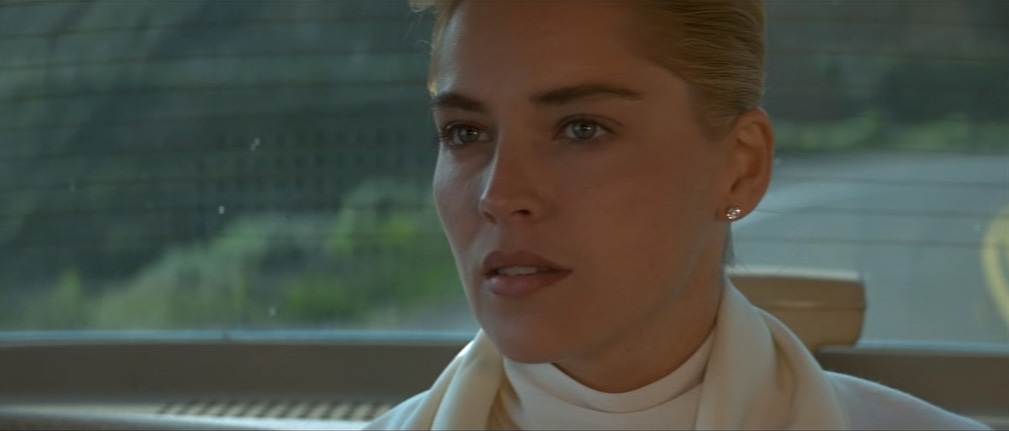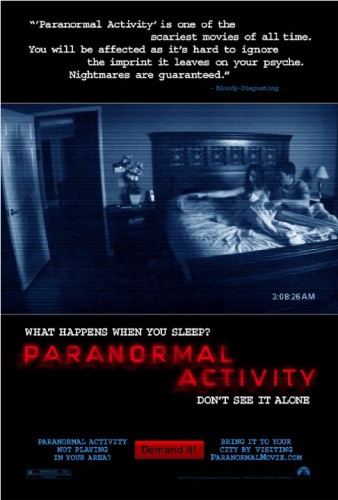This guest post written by Alexandra West appears as part of our theme week on Unpopular Opinions.
What happens when we love something problematic? What happens when in the middle of something problematic there’s something unique, interesting, and incredibly refreshing? How do we as audience members look for the potentially progressive nuggets that drive a filmic narrative forward in new and interesting ways while also understanding that nugget can come wrapped in a basket of deplorable politics? One such case worthy of examination is Catherine Tramell (Sharon Stone) as a progressive anti-hero in Paul Verhoeven’s blockbuster erotic thriller Basic Instinct (1992). The notion of Catherine as a subversive anti-hero develops when you view the film not as a story about the supposed protagonist Detective Nick Curran (Michael Douglas) but as Catherine’s journey from mind games to almost domestic bliss but always returning to her basic instincts which threatens the Hollywood happy ending of established heteronormativity.
Set in San Francisco, notably one of the most queer-positive cities in North America, Basic Instinct centers on the murders of men possibly committed by Catherine, a beautiful, wealthy, murder mystery author with a degree in psychology. The murders all mirror crime scenes directly from her books and homicide detective Nick Curran becomes entangled in the crimes and obsessed with Catherine. Nick can’t decide if Catherine is behind the murders or if he’s in love with her or both.
Throughout the film, Catherine’s bisexuality is at the forefront of her character which marks her as transgressive to the hetro-male oriented police force while the other female characters in the film are also implied or explicitly coded as bisexual or lesbian. Any subtly or nuance in regards to the queer experience in a mainstream blockbuster is wiped away in favor of brash eroticism and the ultimate objectives of Nick who imposes his heteronormativity on his relationships, particularly with Catherine. Nick’s hope is that he’ll be enough for Catherine to settle down for. Catherine is framed in contradistinction to Nick’s almost girlfriend Beth (Jeanne Tripplehorn) a police therapist who plays the typical “good girl” with a maybe sinister past. Nick (and the film) can’t help but conflate both Catherine and Beth in his mind through the lens of the virgin or the whore. Ultimately, Nick’s desire to render Catherine as his own private virgin drives the film towards a mainstream conclusion.
But what of Catherine, the object and prize of the film? Through all the gross biphobia, homophobia, and misogyny of Basic Instinct, Catherine remains an enigma. Her role in the film as foil to Nick’s heteronormative dream is what’s most subversive about her as a character. Her alluring presence confounds those around her; her placement in the film is a clear nod to the femme fatale role, but Catherine occupies the role of narrative driver. The ultimate satisfaction of Basic Instinct in subsequent viewings stems from watching her manipulate the narrative and those around her, watching protagonist Nick succumb to her charms and power. Catherine continually and enjoyably plays with Nick prodding him towards his reckless ways of drinking, drugging, and indiscriminate sex. However, instead of attempting to create husband material out of Nick, Catherine utilizes him for her own purposes of her new book. Her means to an end finishes with her book, her creation, her narrative – not wedded bliss. Catherine’s role as an author is posited by the film as a potential red herring when in fact it actually marks her as the maker of meaning, conducting research through her own means.
It is her manipulation which allows Nick to reflect, grow and change throughout the film for better and for worse allowing him to be the hero he thinks he is. Nick completes the narrative she constructs for him. If he did not play along with her suggestions and supposed whims the film could have had a very different outcome but as Basic Instinct stands, Catherine developed Nick’s narrative of one of toxic masculinity viewing everything other as a threat which in its dark ending suggests that Nick’s white-picket fence goals are as unfounded as the film’s dangerous portrayals of homosexuality. As Nick views Catherine as a prize, she views him as a character in one of her books and just as disposable. Ultimately, Nick needs Catherine more than she needs him.
While Catherine does inhabit the role of the Dangerous Woman (a seemingly modern version of the film noir femme fatale character) cliché and the Murderous Bisexual Women trope, it’s important to acknowledge what is unique and perhaps even progressive about her. She is both the architect of the narrative and her own destruction as she struggles against giving up her agency in favor of a “normal” life. In order to act as a good mother or wife, she’d have to give up the things that made her interesting and alluring in the first place, illuminating the flaws of the patriarchal “happy ending” and ultimately mocking the very thing the film attempts to confirm as an “acceptable” way of life. The role she never gives up on is that of author and creator; her sexuality, identity, and motives are all fluid based on the situation but her God-like power in the film is unmistakable. The film even flirts with a near happy ending for Nick and Catherine which is where the film would have ended if Nick was the true protagonist but instead, the film ends with the vantage point of Catherine’s true intention.
Stone would go on to reprise the role of Catherine Tramell in Basic Instinct 2 (2006) as the only holdover from the previous film. Stone has had a problematic relationship with the original film herself, decrying that the infamous leg-crossing shot was achieved and exhibited without her consent which in essence is the film doubling-down on its problematic nature. Watching the film in this day and age, its troubling and problematic elements ring through clearer than church bells, but the film is also a hugely important cultural touchstone for 1992 as it was the 4th highest grossing film of 1992. The film is marked by Verhoeven and screenwriter Joe Eszterhas’ penchant for creating watchable chaos and mayhem (see also Showgirls) with the film perpetually creating a new audience for itself based on the film’s taboo-inclined nature. Looking back at Basic Instinct as a piece of media that was so widely and readily consumed, its façade is still marred by biphobia, homophobia, and misogyny, yet it’s satisfying to know that Catherine still remains at large, a threat to everything Hollywood deemed acceptable.
See also at Bitch Flicks:
The Trope of the Murderous Bisexual Woman
Alexandra West is a freelance horror journalist and playwright who lives, works, and survives in Toronto. Her work has appeared in the Toronto Star, Rue Morgue, Post City Magazine and Offscreen Film Journal. She is a regular contributor to Famous Monsters of Filmland and a columnist forDiabolique with “The Devil Made Us Watch It.” In December 2012, West co-founded the Faculty of Horror podcast with fellow writer Andrea Subissati, which explores the analytical side of horror films and the darkest recesses of academia.









